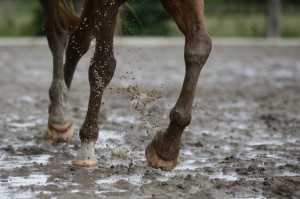
At this time of year it is nigh on impossible to keep your horse looking clean and tidy, with mud sticking to every available inch, and horses turned out looking immaculate get brought in from the field with dirt in the most unlikely places! For most people this is simply annoying and time consuming, but for owners of horses prone to mud fever, it can be a nail biting experience waiting to see if their horse will develop it, or if this year they can stop the problem occurring.
What is Mud Fever?
Mud fever is a term commonly used to describe Pastern Dermatitis. Dermatitis simply means inflammation of the skin; and Pastern Dermatitis, or Mud Fever, is a term used to describe various symptoms that commonly occur on the bulb of the heel or the pasterns, but can spread higher up the leg, or anywhere on the body. These problems are usually caused by bacteria which ordinarily live on the skin of the horse, feeding off waste products. On healthy skin, a population of these bacteria exist with no detrimental effects to the host. However, if there is any abrasion to the skin, such as that caused by boots that have rubbed, a cut or scratch, or skin being harmed by over exposure to adverse, wet conditions, bacteria can enter through the skin and cause an infection. Fungal infection and mites can also be responsible for the infections. This infection, known as Pastern Dermatitis, can represent itself in various forms, from patches of matted hair, scabs and minor swelling to pustular expulsions, sometimes accompanied by lameness. If the infection becomes more serious, the horse may become lethargic, losing appetite and looking generally run down, and you should contact your vet.
How can I treat Mud Fever?
In mild cases, effective treatment can include clipping off excess hair, using an antibacterial leg scrub (such as hibiscrub) and keeping the affected limb dry. Protecting the area using an oil based cream may also be beneficial if the horse is going back into mud; however these creams can also provide an ideal environment for bacteria to multiply between the greasy layer and the skin, so use with some reservation. In more severe cases, antibiotics and anti-inflammatory medications may be necessary alongside a stricter management regime, such as being permanently kept away from mud.
What factors may predispose horses to mud fever?
Damp and mild conditions provide the ideal environment for bacteria population growth, and this includes standing in deep mud or a dirty bed for long periods. Sweat under tack/ rugs can also encourage this, as can over-washing of legs, especially without drying adequately afterwards. OIder horses and those suffering from a depressed immune system may be predisposed to these problems.
How can I reduce the risk of Mud Fever occurring?
As with most problems, prevention is better than cure!
- Try to keep legs as clean and mud-free as possible, and if you can, turn out in a rubber school or concrete pad when mud is very deep. However, if you have no option but to turn out in muddy paddocks, it is debatable whether you are better to wash legs off daily (hence wetting legs on a regular basis), or let the legs dry naturally then gently brushing the mud off. Using waterproof leg wraps can eliminate the need for this. If you do need to wash the legs, ensure you use an antibacterial wash, and thoroughly dry legs after washing to help reduce the risk of mud fever.
- Check for mud fever daily to help pick up on the first signs, to make the infection much easier to deal with.
- In addition to the above management practices, feeding a supplement to keep skin healthy and supple can be very beneficial in cases of mud fever, as this helps to reduce skin abrasions, from which the infections can penetrate the skin. Omega oils are well known for their beneficial effects on skin and provision of additional B-Vitamins are also recommended. Certain herbs can also promote healthy skin.
Olivia Colton MSc, Nutritional and Technical Coordinator For advice or help on this subject, or if you have any other nutritional queries please call our team on 0800 585525 and we would be happy to help.
